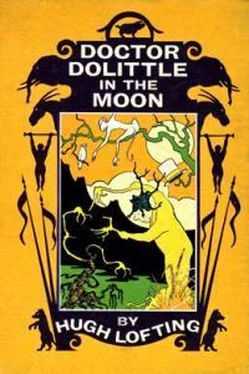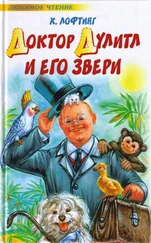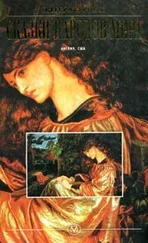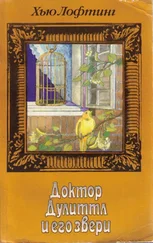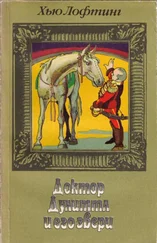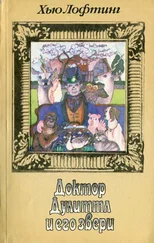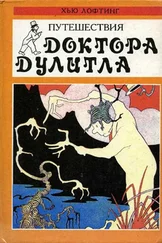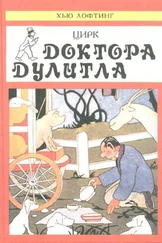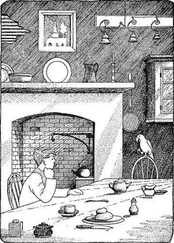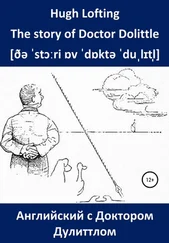Хью Лофтинг - Doctor Dolittle in the Moon
Здесь есть возможность читать онлайн «Хью Лофтинг - Doctor Dolittle in the Moon» весь текст электронной книги совершенно бесплатно (целиком полную версию без сокращений). В некоторых случаях можно слушать аудио, скачать через торрент в формате fb2 и присутствует краткое содержание. Год выпуска: 2014, Издательство: epubBooks Classics, Жанр: Сказка, на английском языке. Описание произведения, (предисловие) а так же отзывы посетителей доступны на портале библиотеки ЛибКат.
- Название:Doctor Dolittle in the Moon
- Автор:
- Издательство:epubBooks Classics
- Жанр:
- Год:2014
- ISBN:нет данных
- Рейтинг книги:5 / 5. Голосов: 1
-
Избранное:Добавить в избранное
- Отзывы:
-
Ваша оценка:
- 100
- 1
- 2
- 3
- 4
- 5
Doctor Dolittle in the Moon: краткое содержание, описание и аннотация
Предлагаем к чтению аннотацию, описание, краткое содержание или предисловие (зависит от того, что написал сам автор книги «Doctor Dolittle in the Moon»). Если вы не нашли необходимую информацию о книге — напишите в комментариях, мы постараемся отыскать её.
Doctor Dolittle in the Moon — читать онлайн бесплатно полную книгу (весь текст) целиком
Ниже представлен текст книги, разбитый по страницам. Система сохранения места последней прочитанной страницы, позволяет с удобством читать онлайн бесплатно книгу «Doctor Dolittle in the Moon», без необходимости каждый раз заново искать на чём Вы остановились. Поставьте закладку, и сможете в любой момент перейти на страницу, на которой закончили чтение.
Интервал:
Закладка:
Luckily the Doctor, while he knew nothing about tailoring, did know something about the natural history of those plants and materials that supply clothes and textile fabrics for Man.
"Let me see," said he one afternoon when we had decided that almost everything we wore had become too small to be kept any longer: "Cotton is out of the question. The spinning would take too long, even if we had any, to say nothing of the weaving. Linen? No, likewise.—I haven't seen anything that looked like a flax plant. About all that remains is root fibre, though heaven help us if we have to wear that kind of material next our skins! Well, we must investigate and see what we can find."
With the aid of Chee–Chee we searched the woods. It took us several days to discover anything suitable, but finally we did. It was an odd–looking swamp tree whose leaves were wide and soft. We found that when these were dried in the proper way they kept a certain pliability without becoming stiff or brittle. And yet they were tough enough to be sewn without tearing. Chee–Chee and Polynesia supplied us with the thread we needed. This they obtained from certain vine tendrils—very fine—which they shredded and twisted into yarn. Then one evening we set to work and cut out our new suits.
"Better make them large enough," said the Doctor, waving a pair of scissors over our rock work–table, "Goodness only knows how soon we'll outgrow them."
We had a lot of fun at one another's expense when at length the suits were completed and we tried them on.
"We look like a family of Robinson Crusoes," said John Dolittle. "No matter: they will serve our purpose. Any port in a storm."
"'We look like a family of Robinson Crusoes'"
For underwear we cut up all we had and made one garment out of two or three. We were afraid as yet to try our new tailoring next the skin. Luckily we only had to provide for a very mild climate.
"Now what about footwear?" said I when I had my coat and trousers on. "My shoes are all split across the top."
"That part is easy," said Chee–Chee. "I know a tree in the jungle which I found when hunting for fruits. The bark strips off easily and you can cut it into sandals that will last quite a while. The only hard part will be plaiting thongs strong enough to keep them in place on your feet."
He guided us to the tree he had spoken of and we soon had outfitted ourselves with footgear which would last us at least a week.
"Good!" said the Doctor. "Now we need not worry about clothes for a while anyway, and can give our attention to more serious matters."
16
Monkey Memories of the Moon
It was when we were on our way to visit still another new kind of plant that the subject of the Moon's early history came up again in conversation. The Doctor had heard of a "whispering vine" which used, as a method of conversation, the rattling or whispering of its leaves.
"Do you remember, Chee–Chee," the Doctor asked, "if your grandmother ever spoke, in her stories of very ancient times, of any peculiar or extraordinary plants or trees?"
"I don't think so, Doctor," he replied. "My grandmother in her talks of the Time Before There Was a Moon kept pretty much to animals and people. She hardly ever mentioned the trees or vegetable world, except to say of this country or that, that it was heavily wooded, or bare and desert. Why?"
"Well, of course in my mind there is no doubt that the Moon was once a part of the Earth, as many scientists believe. And if so I am wondering why we do not see more plants and trees of our own home kinds here."
"Well, but we have, Doctor," said Polynesia. "How about the Asparagus Forests?"
"Quite so," said the Doctor. "There have been many that reminded one of earthly species in their shapes, even if they have grown into giants here. But this speech among plants and trees—and other evidences of social advance and development in the Vegetable Kingdom—is something so established and accepted here I am all the time wondering if something like it had not started on the Earth long ago—say in the Days Before There Was a Moon. And it was merely because our naturalists were not quick enough to—er—catch on to it, that we supposed there was no means of communication among flowers and trees."
"Let me think," said Chee–Chee, and he held his forehead tightly with both hands.
"'Let me think,' said Chee–Chee"
"No," he said after a while, "I don't recall my grandmother's speaking of things like that at all. I remember in her story of Otho Bludge, the prehistoric artist, that she told us about certain woods he used to make handles for his flint chisels and other tools and household implements. She described the wood, for instance, that he used to make bowls out of for carrying water in. But she never spoke of trees and plants that could talk."
It was about midday and we had halted for lunch on our excursion in search of the Whispering Vines we had been told of. We were not more than two or three hours' walk from our old base camp. But that, with the speed so easy in moon marching, means a much greater distance than it does on the Earth. From this camp where the Doctor had set up his apparatus for his special botanical studies, we had now for nearly a week been making daily expeditions in search of the various new species that the Vanity Lilies had described for us. But we always got back before nightfall. Well, this noon the Doctor was leaning back, munching a large piece of yellow yam—a vegetable we got from the edges of the jungle and which we had found so nourishing we had made it almost our chief article of diet.
"Leaning back, munching a piece of yellow yam"
"Tell me, Chee–Chee," said he: "what was the end of that story about Otho Bludge the prehistoric artist? It was a most fascinating tale."
"Well, I think I have told you," said Chee–Chee, "pretty nearly all there was to tell. In the Days Before There Was a Moon, as Grandmother always began, Otho Bludge was a man alone, a man apart. Making pictures on horn and bone with a stone knife, that was his hobby. His great ambition was to make a picture of Man. But there was no one to draw from, for Otho Bludge was a man alone. One day, when he wished aloud for some one to make a picture from, he saw this beautiful girl—Pippiteepa was her name—kneeling on a rock waiting for him to make a portrait of her. He made it—the best work he ever did, carved into the flat of a reindeer's antler. About her right ankle she wore a string of blue stone beads. When the picture was finished she started to disappear again into the mountains' evening mist, as mysteriously as she had come. Otho called to her to stay. She was the only human being he had ever seen besides his own image in the pools. He wanted her company, poor Otho Bludge, the carver of horn, the man apart. But even as she passed into the twilight for ever she cried out to him that she could not stay—for she was of the Fairy Folk and not of his kin. He rushed to the rock where she had knelt; but all he found was the string of blue stone beads which she had worn about her ankle. Otho, broken–hearted, took them and bound them on his own wrist where he wore them night and day, hoping always that she would come back.
"There is nothing more. We youngsters used to pester my grandmother for a continuance of the tale. It seemed so sad, so unsatisfying, an ending. But the old lady insisted that that was the end. Not long after apparently Otho Bludge, the carver of horn and the man apart, just disappeared, completely, as though the Earth had swallowed him up."
"Humph!" muttered the Doctor. "Have you any idea when?"
"No," said the monkey. "You see, even my grandmother's ideas of time and place in these stories she told us were very hazy. She had only had them handed down to her by her parents and grandparents, just as she passed them on to us. But I am pretty sure it was around the time of the Great Flood. Grandmother used to divide her stories into two periods: those belonging to the Days Before There Was a Moon and those that happened after. The name of Otho Bludge the artist only came into those before."
Читать дальшеИнтервал:
Закладка:
Похожие книги на «Doctor Dolittle in the Moon»
Представляем Вашему вниманию похожие книги на «Doctor Dolittle in the Moon» списком для выбора. Мы отобрали схожую по названию и смыслу литературу в надежде предоставить читателям больше вариантов отыскать новые, интересные, ещё непрочитанные произведения.
Обсуждение, отзывы о книге «Doctor Dolittle in the Moon» и просто собственные мнения читателей. Оставьте ваши комментарии, напишите, что Вы думаете о произведении, его смысле или главных героях. Укажите что конкретно понравилось, а что нет, и почему Вы так считаете.
